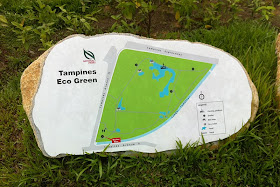Featuring : Tampines Eco Green
Tampines Eco Green is a 36.5 Ha urban park that was recently opened in early April 2011. It is situated at the fringe of Tampines Town at the north-eastern part of Singapore. The park is bounded by Tampines Expressway, Tampines Avenue 12 and Sungei Tampines canal.

Tampines Eco Green is a haven for biodiversity and has various natural habitats such as marshes, secondary rainforests, open grasslands and freshwater ponds. The features in the ecologically-themed park include a viewing platform, an eco-toilet, vegetated bioswales, bird hides, and green roofs on all the rest shelters and toilet. A unique feature of the park is the wide Zoysia grass main trails that is easy on the feet and suitable for visitors of all ages.

 |
A typical bioswale drainage at the park |
NParks and the consultants involved in the park should be commended for making every attempt to design eco-friendly features in the park. Whilst areas were cleared and additional landscaping and amenities added, this park is an excellent example of leaving large parts of the site 'natural' and no attempt was made to remove the natural flora on site.
So a visitor can encounter areas which appear rather "unkempt" with uncontrolled growth of Lallang, wild weeds, exotic tree species like Acacia auriculiformis.and so on.

All park furniture such as the signage, benches, bird hides, earth mounds and hedges were designed using recycled materials and environmentally-friendly labelled products.
Every attempt was also made to harmonise signage, seats and other park paraphernalia to appear like natural objects in the park.
The main sign - Tampines Eco Green fronting the primary access to the site off Tampines Ave 9 is made from recycled wood.
Having large water bodies and luxuriant greenery, the park is home to many dragonflies, butterflies and birds. In various parts of the park, areas are left waterlogged and submerged, with snags, or dead trees and branches emerging from the water.
 |
A bird-watching hide made of dead twigs and branches |
These perches are favourites amongst the bird photographers, who lay in wait for a perfect shot of some of the birds that abound in the park.

Signage is ample around the park, and it is unlikely that anyone would get lost in this urban 'jungle'. Paths are clearly marked and safe, and forks and junctions along the main trail have directional signs to point visitors to other areas and features in the park.
 |
A view towards the main entrance to the park |
The managed planting of some flowering plants and butterfly-attracting plants like Crotalaria and Leea rubra has helped sustain a good population of species at Tampines Eco Green.
 |
Two Silverline species at one go! |
Amongst the more spectacular ones are the Lycaenidae from the Spindasis genus. Both the Silverlines - the Long-Banded and Club Silverlines, can be found here. At times, up to even a half a dozen of these pretty hairstreaks can be found on the ruby-red flowers of the Leea rubra bushes!
 |
A Pea Blue on the flower of the Crotalaria |
Closer to the secondary forested areas, vines of the Stinking Passionflower (Passiflora foetida) can be found. This explains the presence of two of our 'foreign talent' species, the Tawny Coster and the Leopard Lacewing, being spotted at this park.

Other species are more of the urban butterflies and those that feed on the monocotyledonous plants. Examples are the Satyrinaes and Hesperiinaes. With the ample supply of Leguminosae plants like Mimosa spp and Paraserianthes (Albizia), the park's resident Grass Yellows are quite evident as they flutter amongst the wild flowers on a hot sunny day.
And so we have another new destination in eastern Singapore for close encounters with nature, a peaceful walk to enjoy quality time with family members or a jog in the park to keep up with a healthy lifestyle.
How to get there :
There are several bus services that bring visitors to the bus stops along Tampines Ave 9. For those taking the MRT, alight at Tampines MRT station and it's a 20 minute walk to Tampines Eco Green. Drivers can park at Tampines Housing Estate Block 408, 409, 412,413 and 414, where parking is free on Sundays and Public Holidays.
 |
Map of Tampines Eco Green. The blue dot shows the main entrance |
The initial base checklist of butterflies at Tampines Eco Green is as follows :
- Lime Butterfly (Papilio demoleus malayanus)
- Common Mime (Chilasa clytia clytia)
- Common Mormon (Papilio polytes romulus)
- Common Bluebottle (Graphium sarpedon luctatius)
- Lemon Emigrant (Catopsilia pomona pomona)
- Orange Emigrant (Catopsilia scylla cornelia)
- Mottled Emigrant (Catopsilia pyranthe pyranthe)
- Striped Albatross (Appias libythea olferna)
- Psyche (Leptosia nina malayana)
- Painted Jezebel (Delias hyparete metarete)
- Common Grass Yellow (Eurema hecabe contubernalis)
- Chocolate Grass Yellow (Eurema sari sodalis)
- Black Veined Tiger (Danaus melanippus hegesippus)
- Dark Glassy Tiger (Parantica agleoides agleoides)
- Common Palmfly (Elymnias hypermnestra agina)
- Nigger (Orsotriaena medus cinerea)
- Dark Brand Bush Brown (Mycalesis mineus macromalayana)
- Chocolate Pansy (Junonia hedonia ida)
- Blue Pansy (Junonia orithya wallacei)
- Peacock Pansy (Junonia almana javana)
- Tawny Coster (Acreae violae)
- Lesser Grass Blue (Zizina otis lampa)
- Pea Blue (Lampides boeticus)
- Ciliate Blue (Anthene emolus goberus)
- Club Silverline (Spindasis syama terana)
- Long Banded Silverline (Spindasis lohita senama)
- Common Tit (Hypolycaena erylus teatus)
- Bush Hopper (Ampittia dioscorides camertes)
- Palm Bob (Suatus gremius gremius)
- Lesser Dart (Potanthus omaha omaha)
- Palm Dart (Telicota augias augias)



















